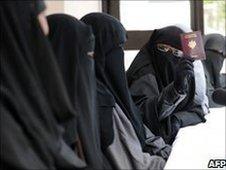French parliament debates Islamic veil ban
- Published

Only a tiny percentage of French Muslim women wear full veils
The French parliament is debating plans to ban the wearing of full Islamic veils in public.
The bill in front of the lower house would make it illegal to wear the niqab or burka anywhere in public.
It envisages fines of 150 euros (£119) for women who break the law and 30,000 euros and a year jail term for men who force their wives to wear the burka.
A vote on the proposed legislation will be taken next week before a full vote in the senate in September.
The veil ban, which is expected to be backed by a majority of French MPs, is also winning support in other parts of Europe.
Belgium's lower house has approved a similar measure and Spain's senate recently narrowly voted to impose a ban, too.
'Hijacking Islam'
At the start of the three-day debate in the National Assembly, French Justice Minister Michele Alliot-Marie told lawmakers that wearing a face-covering veil "amounted to being cut off from society and rejecting the very spirit of the French republic that is founded on a desire to live together".
Prime Minister Francois Fillon set the tone of this debate last week at the opening of a new mosque in the suburbs of Paris, the BBC's Christian Fraser reports from the French capital.
Muslims who wore the full veil were "hijacking Islam" Mr Fillon said, providing a "dark sectarian image" of the religion.
Though members of parliament from across the political spectrum have criticised full Islamic veils, the French Green and Communist parties oppose a law limited to that issue, saying it stigmatises Muslims.
The opposition Socialist Party, which has argued for a partial ban that would be enforced in public offices and shops but not on the street, is expected to abstain from a vote. That would allow the bill to pass comfortably.
There are estimated to be only about 2,000 women wearing the full veil in France, with most of these in the niqab rather than the burka, although the bill is opposed by many of France's five million Muslims.
Critics of the new legislation point to studies by the interior ministry that show many women do not fit the stereotype of marginalised, oppressed women, since a large number have taken the veil of their own volition.
The police unions have already expressed concerns over how such a law will be enforced and the idea of pressuring women to remove the veil.
There are also human rights considerations, and legal experts warn the broad scope of the law banning the veil in all public places as opposed to state institutions could be overturned by the constitutional court.
Amnesty International has said a ban would "violate the rights to freedom of expression and religion".
- Published19 May 2010